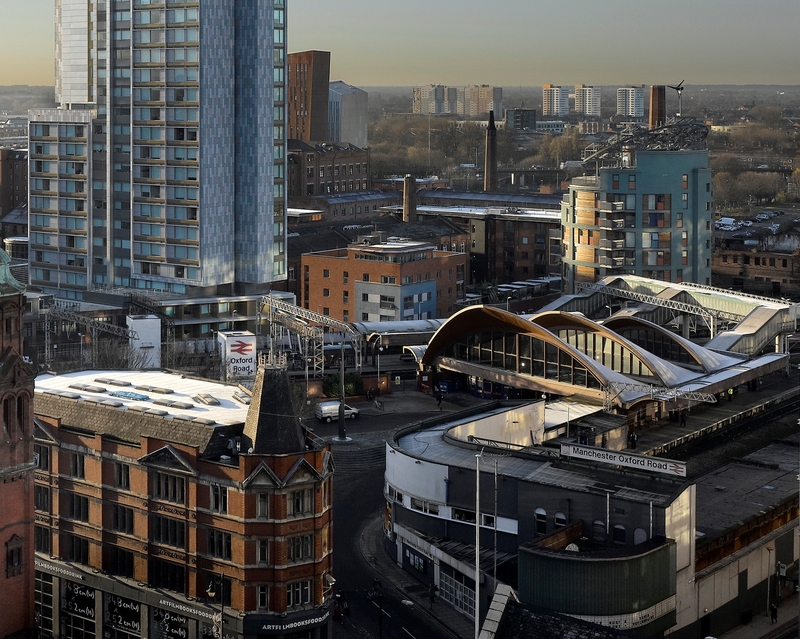Tori Attwood meets the wheelchair user speaking out against poor planning and thoughtlessness
A woman goes into a toilet and finds a motorcycle. It sounds like the beginning of a terrible joke but this is a reality.
This ludicrous scenario was faced by Sara, an electronic wheelchair user who wanted to access the disabled toilet at Deansgate train station. “I’ve opened doors before, especially in pubs, and there’s been high chairs and ladders – but that’s the first time I’ve seen a motorbike,” laughs Sara, explaining her reaction to the bizarre scene. “I know that’s extreme, but [disabled toilets] are used as store rooms a lot. I once found a massive wide screen television in one of them, which is obviously really heavy and I can’t even get around that.”
In a new short documentary, Sara is followed for a day to highlight the disabled accessibility problems in Manchester city centre. Sara has Ehlers-Danlos syndrome (EDS), a condition that affects the body’s connective tissue and causes her joints to dislocate from simple actions such as picking up her handbag. Sara’s type of EDS is also extremely rare – there are only 40 people in the world who have the same type.
“I don’t really know where the thought process is, because obviously with the equality act, these places are ticking the boxes by having an accessible toilet," she explains. "However, when it’s full of junk it’s not really accessible. But it was funny and it couldn’t have happened at a better time I suppose.”
Although a member of staff came to remove the motorbike, Sara explains that she has experienced hostility in similar situations.
“I always ask politely and try to make a joke about it, but often the response isn’t very favourable. There’s quite a lot of huff-and-puff over having to the move the stuff out. Maybe because they’re embarrassed, I don’t know, and obviously, it can be time-consuming if there are ladders and paint. Maybe it’s the way they handle their embarrassment.
“A lot of it is a lack of awareness, lack of understanding and lack of people knowing how to communicate with people with disabilities. It’s human nature when you find something uncomfortable to shy away from it.”

Poor road maintenance, badly designed dropped kerbs and lamp posts wrongly positioned in the middle of public footpaths were further issues Sara faced on her trip around Manchester - all of which made her feel uncomfortable, excluded and at risk of physical harm.
“When we went into Deansgate station we were met by a flight of stairs, but there was no explanation or signage to where the accessible entrance was,” Sara explains. “It’s just lack of thought. For example, where there’s roadworks going on [outside Deansgate], they’d just put a chunk of tarmac down as a so-called ramp but it wasn’t really wide enough for me to get my wheelchair down, and mine's not a particularly wide wheelchair.”
“Oxford Road Station also has a really steep walkway. I know people who use crutches and who would just never be able to get up there. I would imagine elderly people would struggle as well. I know it’s difficult because you can’t change the geography of the land. But that train station is inaccessible.”
“I don’t usually find cities particularly easy as a wheelchair user. It’s not just Manchester, it’s a lot of cities – the volume of people, the volume of traffic and the logistics can make it difficult.”
Manchester city centre has one of the highest proportion of people reporting a life-impacting disability (14%), whilst 1-in-5 people reported some form of disability in the UK, according to the 2011 census. Whilst Manchester City Council has been trying to improve accessibility through the All-Age Disability Strategy since 2014, clearly more needs to be done in the city centre.
However, Sara did find some newer parts of the city to be more accessible. “All round the Deansgate Metrolink station was really well done and well thought out. At the crossing where they have the ramp, it’s tarmacked over so it is built like part of the road and it’s nice and wide. And I would imagine that it wasn’t that costly either because it appears to just be a thicker part of tarmac. That was really good.”
When asked whether the attitude and support towards disabled people was changing, Sara was concerned.
“I think it’s not a good time to be disabled at the moment. There’s a lot of change and a lot of it is not for the better. There’s just so much cutting-back of services.”
“When the coalition government got in, there was a lot of changes to disability benefits and there was a portrayal of disabled people in the media as being benefit-scroungers. I noticed a big shift in attitudes. Attitudes were coming out that I thought had been long gone.
"The official statistics for benefit fraud is actually less than one percent."
Of the UK’s 11.5 million disabled people, just 49% are currently in work
Through the documentary, Sara also wants to tackle disability discrimination in the workplace.
Of the UK’s 11.5 million disabled people, just 49% are currently in work, compared to 80% of non-disabled people. Sara believes the lack of awareness towards disabilities has a significant impact on employment opportunities.
“It should be a statutory requirement for disability training to be brought into employment law,” Sara commented on the recent findings.
Recent research indicates that almost half of UK businesses (45%) are apprehensive about hiring someone with a disability because of fears they won’t be able to do the job, while 43% of employers also expect disabilities to be disclosed on an applicant’s CV prior to interview, despite there being no legal obligation to do so.

Sara’s video documentary was commissioned by serious injury solicitors’ firm Potter Rees Dolan, after its lawyers noticed first-hand the challenges their clients regularly face when travelling into and around the city centre.
“I wanted to take part in the awareness campaign because I wanted to highlight some of the issues that people who don’t have a disability might not see from their own perspective,” Sara explains.
When it comes to making Manchester more accessible, Sara suggests that more thought should be put towards small improvements.
“If we both drove to Manchester in our cars, get here and get out our cars and go towards a building – only to discover that the building has no ramp – it’s only at that point that I become disabled. Because if there’s a ramp there, no problem, we both carry on and go into the building and we both reach our destination.
"It’s just a little bit of extra thought. Something small can make a massive difference.”













